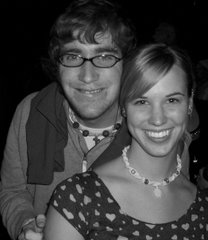This week we were to read the intro and first chapter of a book by Steven Johnson called Emergence. The introduction began by describing self-organizing communities using slime mold as an example. At first I was really confused as to how it was related but then it was explained that slime mold doesn't have one leader mold organism. There is not one pacemaker cell "calling all the shots". They each release something called cyclic AMP depending on their own assessment of their environment and then form to become a community based on that. One real life example that I thought of while reading this was riots. Particularly riots in Madison on Halloween. There is not one person that decides to have a riot at 2 in the morning. Everyone gets increasingly intoxicated and, based on their surroundings, senses the need to continue to drink and then all of a sudden a big mass of chaos forms all by itself! Maybe not the best example....but thats what came to my mind. I also thought that the part in the first chapter that talked about the ants was really interesting. It is weird that the ants know where exactly to put the garbage so its as far away from both the colony and the dead ants as possible. It really is curious how all the ants just do certain jobs without being told to. The queen doesn't assign them jobs like in the movie "Ants". But then again, isn't that how our world is? At least in our society we can just pick whatever we want to do based on what we are good at and what we enjoy. maybe that is how it is for ants. Or maybe the baby just picks an adult ant to follow around and ends up doing whatever their job is for the rest of their life....kind of like family businesses.
I also enjoyed reading about the formation of Manchester. The population began to explode and people basically organized themselves however they wanted. The poor ended up being confined to certain streets far away from the rich. This isn't all that strange when you think about it though. Poor people are obviously going to live near one another so they can support each other and the rich don't want to see poor people. So, wherever the first poor person decided to settle everyone followed. I wasn't quite sure how the homosexual secret clusters really tied in to emergence, other than that a guy that would go there wrote a paper on morphogenesis. I liked this reading a lot because it explained things well and didn't get too wordy like some of our past readings. I am excited to have a class discussion about it....but, class is canceled tomorrow :) because Scot is sick :( Get better!!!
Subscribe to:
Post Comments (Atom)

5 comments:
I like your example of riots on Halloween. I wonder if that would be an example of chaos more so than complexity: the riots certainly did not organize in a way that is self-sustaining; they just kind of blow up.
I also agree with you that this book is easy to read and pretty interesting. I was a little confused about the settling of Manchester. Do you think that when the first person settled somewhere, they could be considered a pacemaker?
Your example with the riots on Halloween is really good and I think you explained it well. It is definitely a sort of emergent behavior. In regards to Erin's comment, I am wondering whether the self-sustaining part is necessary? Does the system need to sustain itself for a given period of time to consider it complex?
i never thought about the ant example as like how we choose what we want to do based on what were like and what we are good at. I see how that could definitely fit in to emergence!
I don't know if riots would count because they are definitely not self-sustaining. I was just looking at the fact that there is not one initiator. Regarding if the first person to settle is a pacemaker I am not sure. I mean is there ever somewhere that ONE person randomly settles? Its usually a group of people and then goes from there.
Post a Comment